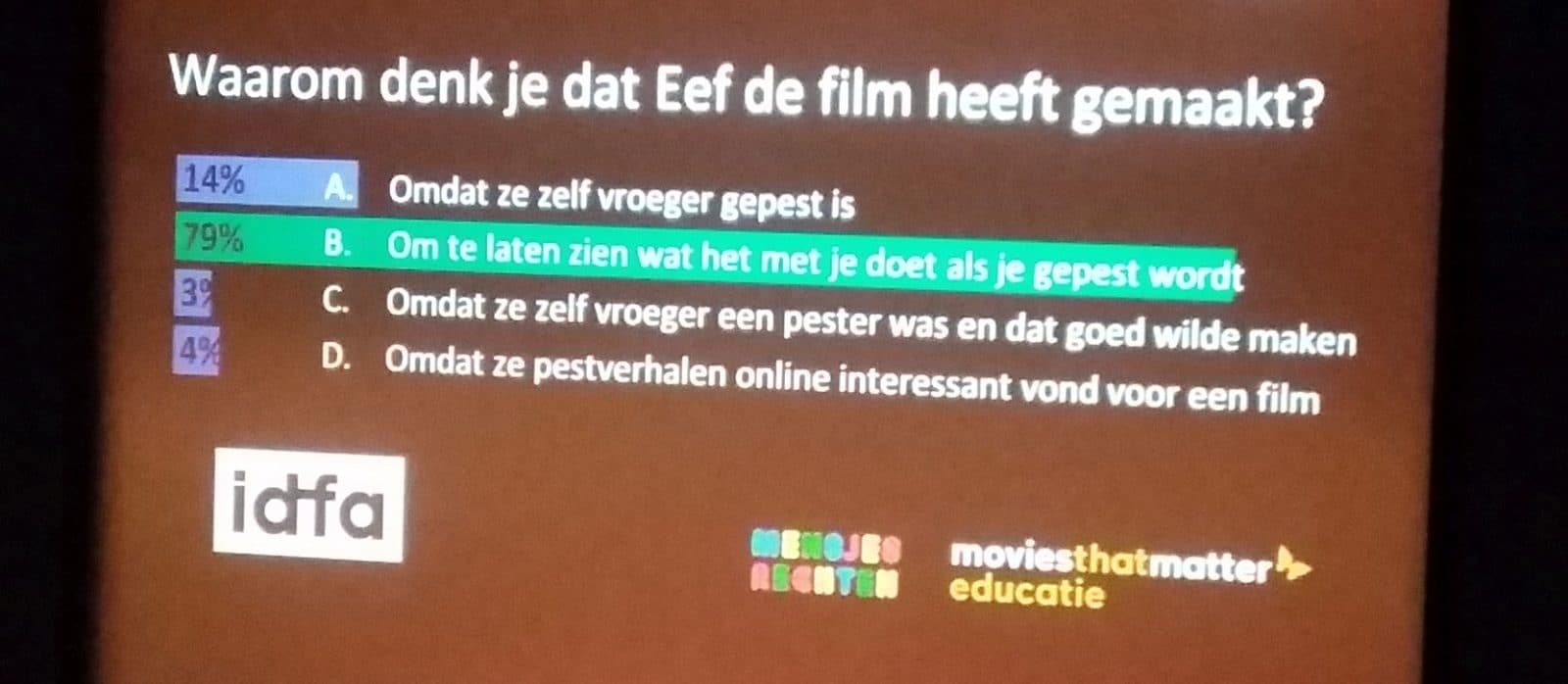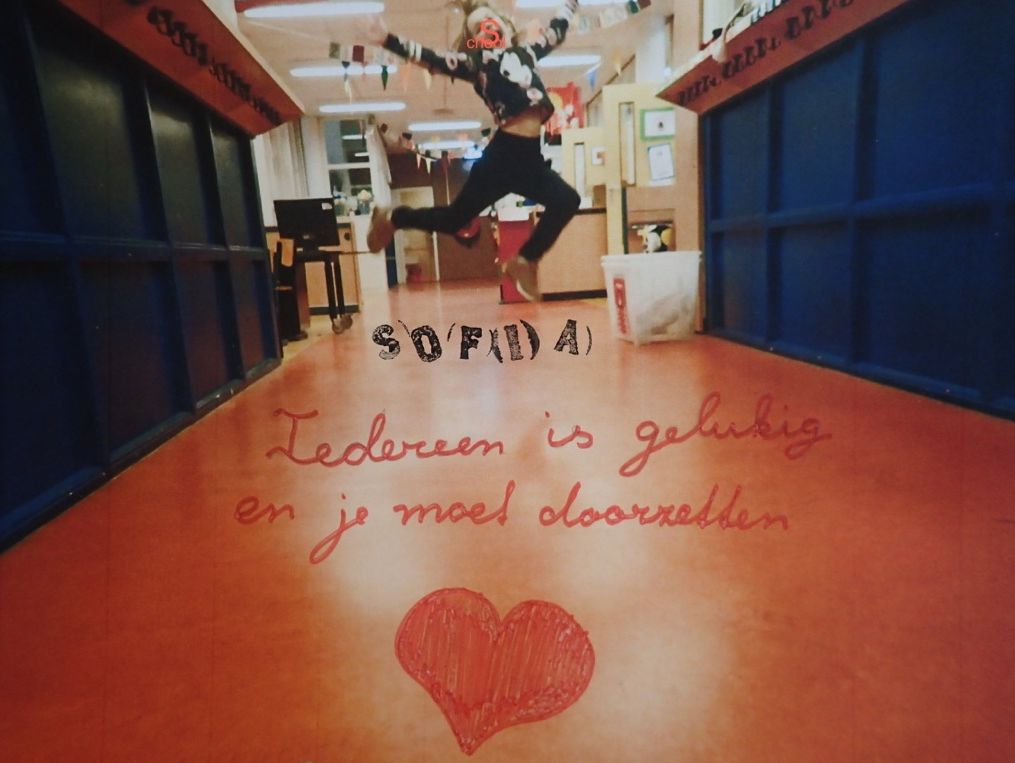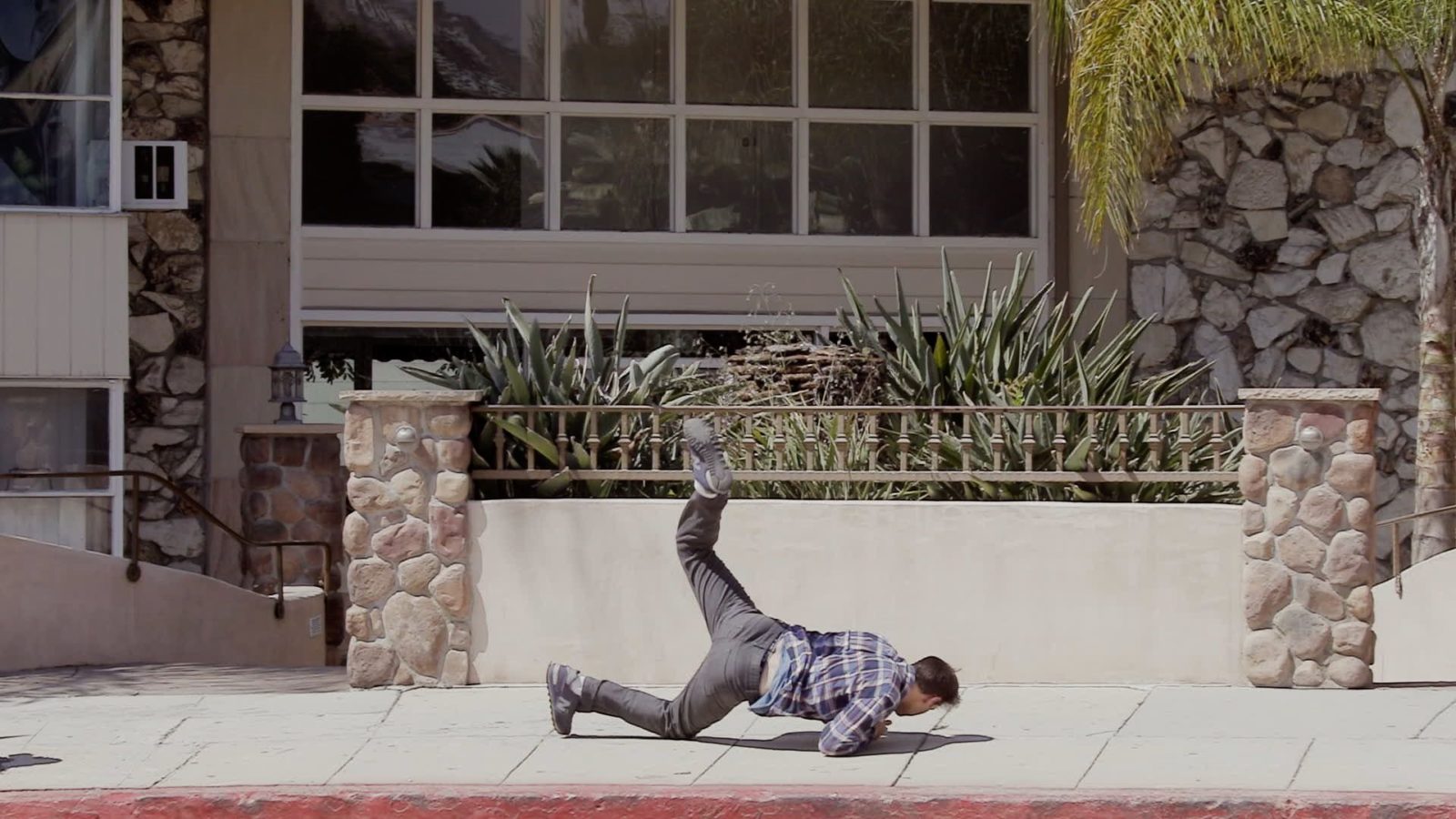On the VPRO/Cinekid Top-100 of children's and youth films includes only two documentaries. Too few, according to Meike Statema, head of education at IDFA. According to her, documentaries can really resonate with children and offer just as enriching an experience as feature films. Moreover, film education will soon be part of the curriculum. Fortunately, there are many choices for enterprising teachers to get started with films and teaching materials. A large number of festivals, producers and arts organisations have something on offer in this area. The Amsterdam documentary festival IDFA Put education in the shop window.
What's it going to be? Taking the class to a workshop around the exciting mystery The man who looked beyond the horizon, or at school working on the creative documentary LISTEN? Making discrimination surprisingly visible with Night, or let the kids record Virtual Reality themselves?
Stunt cyclist
I can see the commitment of the festival with my own eyes when I attend a screening with which IDFA, together with Movies That Matter and EO/Ikon Docs celebrates Children's Rights Day. To make it extra festive, BMX cyclist Patrick livens up the event with his stunt work. That as a warm-up for 180cc (René van Zundert) on Jose in Rotterdam-Zuid. Stunt cycling is his passion. Other things in his life bother him.
But children's rights day begins with #pest story by Eef Hilgers, a short film in which four children tell remarkably candidly how hard bullying has affected them. "I don't really know who I am anymore," says Rosalie. As soon as the film begins, the cheers in the Tuschinski theatre hushed and everyone was silent. #pest story is therefore close to children's experiences.

A nice bonus, of course, is that at the debriefing, children from the film appear on stage. The audience may ask questions. However, it cannot be. Meanwhile, voting boxes have been handed out for the young viewers to give their opinions on questions like 'Which do you think is worse, online bullying or bullying in the schoolyard' or 'Why do you think Eef made the film'. The scores will appear live on screen.
Docschool
Every year during IDFA, some 10,000 children attend the school screenings that the festival programmes. These are not as elaborately rigged as the Children's Rights event, but there is always an introduction and an after-talk or Q&A with the makers.
For teachers who want to work with film at school, there is a year-round programme Docschool Online available. A catalogue of about 140 classroom-viewable children's and youth documentaries, including teaching materials. Teachers can use this free of charge. On request, IDFA can also arrange for a documentary filmmaker to visit the classroom. Incidentally, of course, IDFA is not the only one presenting something like this. Most providers, including those of educational material for feature films, can be found at filmeducation.co.uk.
Do you bring a film into the classroom to discuss a theme in geography or social studies, or do you want to let children discover the creative side of filmmaking? Both are possible. IDFA's teaching materials usually cover both aspects.
Children get to work
It doesn't have to be difficult. See, for example, how it works with LISTEN, Astrid Bussink's multi-award-winning documentary about The Children's Telephone. The special design is striking. As we listen in on phone calls, we see not the children themselves, but images that reflect the tone of the conversation - sweet, naughty, sad, poignant.
Group 7 of primary school De Bron will go on their own at the school during IDFA with LISTEN to work. After screening in class, the teacher discusses the content - stories about divorced parents, being alone and pets. But also an angry boy who tells that he actually struggles with being gay, and doesn't want to be. In our experience, grade 7 children are more open-minded on such topics than adolescents a few years older. But count on it to trigger emotions.

The next day I watch the photography workshop that FOAM in doing so. Looking closely at images. What feeling do they show? Then the assignment: think of a sentence and take a picture that represents it. With the cameras handed out, the class wanders around the school and the schoolyard to take cool or funny pictures of each other. Then use felt-tip pens or stickers to add text to the printed pictures. I am amazed at how enthusiastically everyone gets to work with phrases like 'My favourite colour is blue', 'A strong boy who hits' or 'I don't like cleaning'.
A very different children's documentary

The documentaries mentioned above are about children struggling with some kind of problem. This is a common formula, but at a study afternoon for teachers, Martijn Blekendaal shows that it can be done very differently. His The man who looked beyond the horizon is about the artist Bas Jan Ader. Over forty years ago, he wanted to sail from America to England in a tiny sailing boat - and never arrived. Martijn turned it into an exciting narrative and at the same time a cinematic experiment.
Blekendaal explained to me earlier That as a youth film (for 10-15 year olds), it's a bit of a leap of faith. Children from IJburg college get to see it as the first audience a few days later. When the title 'END' appears after the first frame, spontaneous applause sounds. Attention is captured. What follows after this unusual beginning is an exploration full of mystery, unexpected twists and sidesteps, crazy film fragments, slapstick, memories, melancholy, poetry and tragedy. About art, filmmaking and overcoming your fears. In the film, Blekendaal himself also does something he didn't actually dare to do.
"Would you give the film a prize?", I ask a few viewers afterwards. The response is positive.
That question is not accidental. The jury of the IDFA Kids & Docs competition had the day before The man who looked beyond the horizon awarded the Special Jury Award - say second prize. Producer Cerutti Film has launched an impact campaign following IDFA to ensure that more happens with the film than just regular screenings.
As part of media literacy, a workshop is then attached to it that shows how artists work with images. Children are asked to use existing photos to tell a new story. The meaning of an image is not fixed.
Creative or social
The man who looked beyond the horizon fits well with the CKV subject. The short fiction film also shown at the teachers' afternoon Night By Joosje Duk (from the offer of Movies That Matter) is again more in line with the social studies curriculum. Yet the creator's surprising choice of form offers a creative angle here too.
Four girls go into Night a night out in New York and run into the divide between white and black. But beware: things are different than they seem in this seemingly realistic fantasy about discrimination and microaggression. Guarantees lively and diverse reactions, as the presentation already shows. Learning material online from December at Movies That Matter.
There is even now a real Vitual Reality workshop for children who want to get their hands dirty. View't and Imagine movie on the teachers' afternoon, let participants experience it for themselves. Using real VR cameras, students will soon be filming the final scenes of the VR fiction film in small groups The Retake. Three desperate students try to find out the exam papers with help from the ghost of the late rector. Is something completely different again. The entire workshop package includes a visit to the Imagine Film Festival taking place at Eye in April.
Top 15
To return to that criticism of the Top 100, the IDFA education department has not let up. There is now also a IDFA Summit Of 15 must-see youth documentaries.
Lots of information on the range of youth documentaries and feature films, teaching materials and workshops can be found at filmeducation.co.uk, amsterdamsfilmmenu.nl and IDFA Docschool. Screenings with accompanying workshop of The man who looked beyond the horizon are already programmed at the Van Abbemuseum in Eindhoven, children's museum Villa Zebra in Rotterdam and at Library Hilversum. For more info on this project: Cerutti Film and www.achterdehorizon.nl
